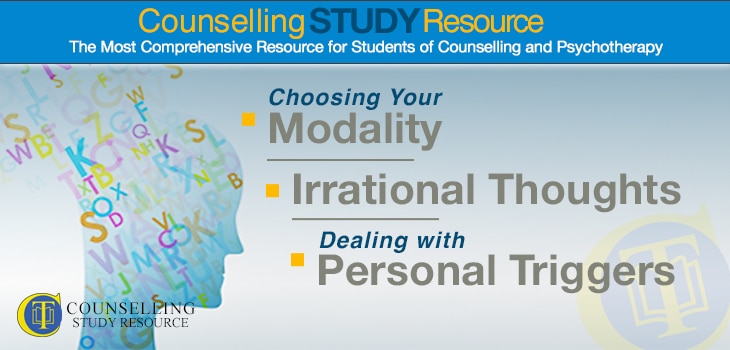024 – Choosing Your Modality – Irrational Thoughts – Building a Website 1 – Dealing with Personal Triggers
In episode 24 of the Counselling Tutor Podcast, Rory Lees-Oakes and Ken Kelly discuss how to choose the modality you will practise. ‘Theory with Rory’ looks at irrational thoughts, and ‘Person-Centred Business’ explains how to build a website. Last, the presenters suggest how to deal with personal triggers as a counsellor.
Choosing Your Modality
In choosing which counselling modality to practise, it is very much a case of ‘horses for courses’ – the presenters use the analogy of different styles of music, played by different instruments. In his book To Lead an Honorable Life, John Shlien (a student, colleague and friend of Carl Rogers) comments that ‘all theory is autobiographical’. In other words, the theory and modality you chose must be meaningful to you and fit with your personal philosophy. Different modalities are right for different clients and presenting issues. Whichever modality you choose, the therapeutic relationship is key, as is thorough training.
Irrational Thoughts
Rory sets the scene for the theory slot by referring to M Scott Peck’s book The Road Less Travelled. The underlying philosophy here is stoicism: an acceptance that life is neither fair nor easy, and that self-control and mental toughness are needed to overcome irrationality. Epictetus, a first-century stoic philosopher, said: ‘What really frightens and dismays us is not external events themselves, but the way in which we think about them. It is not things that disturb us, but our interpretation of their significance.’
Humans have a tendency to think irrationally when they are feeling emotional. Rory goes through the 11 irrational beliefs put forward by Albert Ellis, the American psychologist who developed rational emotive behaviour therapy (REBT):
- It is a dire necessity for adult humans to be loved or approved by virtually every significant other person in their community.
- One absolutely must be competent, adequate and achieving in all important respects or else one is an inadequate, worthless person.
- People absolutely must act considerately and fairly and they are damnable villains if they do not. They are their bad acts.
- It is awful and terrible when things are not the way one would very much like them to be.
- Emotional disturbance is mainly externally caused and people have little or no ability to increase or decrease their dysfunctional feelings and behaviours.
- If something is or may be dangerous or fearsome, then one should be constantly and excessively concerned about it and should keep dwelling on the possibility of it occurring.
- One cannot and must not face life's responsibilities and difficulties and it is easier to avoid them.
- One must be quite dependent on others and need them and you cannot mainly run one's own life.
- One's past history is an all-important determiner of one's present behaviour and because something once strongly affected one's life, it should indefinitely have a similar effect.
- Other people's disturbances are horrible and one must feel upset about them.
- There is invariably a right, precise and perfect solution to human problems and it is awful if this perfect solution is not found.
Rory goes on to discuss intrusive thoughts; these are experienced by around one in four people. He gives an example based on driving on the motorway, and thinking about the possibility of purposely crashing. It is important to remember that thinking and acting on that thought are two very different things, and that such thoughts are part of being human and are ‘normal’ (whatever that might mean).
Building a Website 1
In the first of a number of pieces on building a website to promote your counselling business, Ken asks whether you need a website. He believes you do – it is a great place for potential clients to find out about you, what your offer, and your style. He goes on to discuss whether to build the website yourself or to pay a professional to do so.
There are various low-cost or even free options if you wish to build your site yourself, for example Weebly and Wix. Hosting companies also provide DIY templates – for example, 1&1, 123 Reg, GoDaddy and Hostgator. However, the software on all these is limited in ways that may not be immediately obvious.
Ken recommends WordPress, which is free. WordPress.com again offers a template-based approach, while WordPress.org allows you to download the WordPress software to your domain provider.
Another option is to ask a professional to construct your site. Many web designers will do so for a very reasonable price these days.
Dealing with Personal Triggers
To be able to deal with personal triggers in the counselling room, we must understand our own process, and so be able to spot and avoid parallel process. Personal development is key, and is continual even for experienced therapists. This may take place through personal counselling, supervision, and professional discussion and personal-development group at your learning provider. Sometimes, it may be necessary to take a break from counselling if you are dealing with a tough personal situation (e.g. bereavement or divorce). Not facing up to your own process risks damaging both you and your clients.
Links and Resources
To Lead an Honorable Life: Invitations to Think About Client-Centred Therapy and the Person-Centered Approach by John Shlien (published by PCCS Books, 2003)
The Road Less Travelled by M Scott Peck (published by Arrow Books, 1990)


